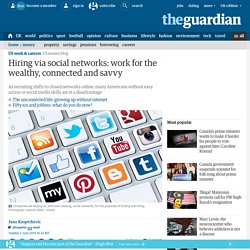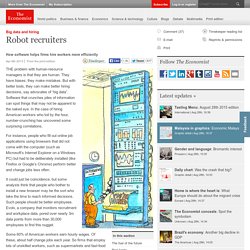

Amazon's Current Employees Raise the Bar for New Hires. Amazon's Current Employees Raise the Bar for New Hires. Hiring via social networks: work for the wealthy, connected and savvy. Here's an interesting paradox: more bosses like to use social media, like LinkedIn and Twitter to hire.

It sounds great: free, open, casting a wide net. But here's the catch: what if it limits the good jobs to people who have great connections on social media, rather than just great skills? One thing is indisputable: the job-search process is an unholy technological mess. With 287,000 Americans currently unemployed and currently looking for a job, recruiters are flooded with emails; job searchers sift through endless postings on socially connected networks like Twitter, LinkedIn, company websites and various other job boards.
“We spam them, they spam us back,” Michael Bailen, head of talent acquisition at Zappos told the Wall Street Journal last week. And so the innovative online shoes and apparel retailer has made a bold decision: no more job postings. Job postings are a conversation killer. What Zappos does need, according to Zapar, is interaction with its potential employees. Small businesses find online recruiting has pitfalls as well as positives. Richard Dukas, the chairman and CEO of Dukas Public Relations, has 20 employees.

Hiring more takes some work. “We have used LinkedIn, Mediabistro and also social media, such as Facebook and Twitter,” says Dukas, who also finds the time to use industry site O’Dwyer’s. “We also advertise jobs at various universities and have job applicants reach us through personal references.” Dukas has found what many business owners have: while the internet has made candidates more available, it doesn’t necessarily provide the best-qualified ones. Dukas mentioned some of the most common mistakes he deals with; including long cover letters that focus on the wrong things. Many small business owners hailed the rise of online jobs sites, which have become ever more sophisticated; it beat the previous convention of placing an ad in a local newspaper.
Joe Rierden, the founder of Rierden Chemical & Trading Company in Libertyville, IL, sells chemicals to giants like Dow and Sherwin Williams. Recruitment: My place or yours? Social networking: The LinkedIn effect. Big data and hiring: Robot recruiters. THE problem with human-resource managers is that they are human.

They have biases; they make mistakes. But with better tools, they can make better hiring decisions, say advocates of “big data”. Software that crunches piles of information can spot things that may not be apparent to the naked eye. In the case of hiring American workers who toil by the hour, number-crunching has uncovered some surprising correlations. For instance, people who fill out online job applications using browsers that did not come with the computer (such as Microsoft’s Internet Explorer on a Windows PC) but had to be deliberately installed (like Firefox or Google’s Chrome) perform better and change jobs less often. It could just be coincidence, but some analysts think that people who bother to install a new browser may be the sort who take the time to reach informed decisions. Some 60% of American workers earn hourly wages. Evolv mines mountains of data. From headhunters to culture vultures.